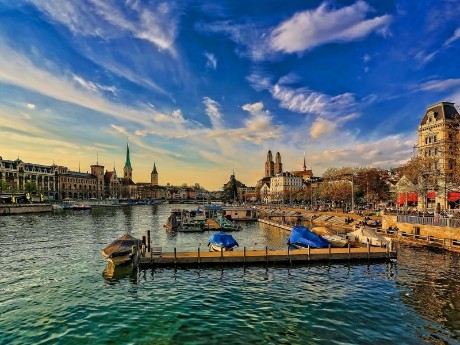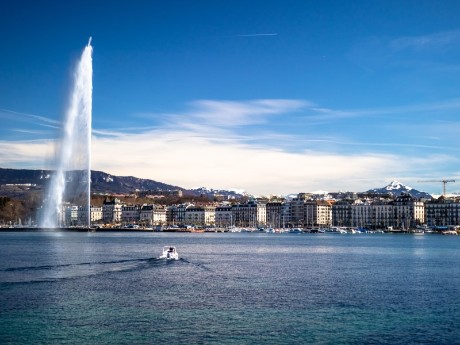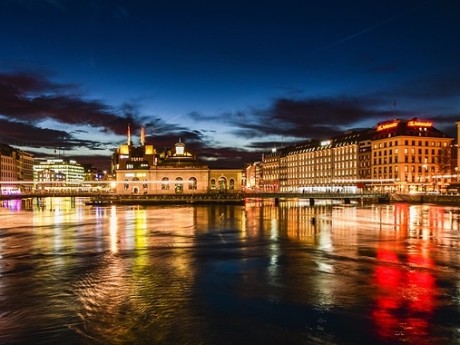Switzerland: Zurich & Geneva
Discover ancient architecture, indulge in delicious meals and marvel at breathtaking sites on your Switzerland journey. Start your journey in Zurich, the largest city in Switzerland. Art enthusiasts will enjoy the outstanding museums such as Kunsthaus Zurich while shopaholics will find paradise at Bahnhofstrasse. For those more in touch with nature, take a boat cruise tour or visit Switzerland's many lakes and waterfalls, such as the Rhine Falls.
Read more
Discover ancient architecture, indulge in delicious meals and marvel at breathtaking sites on your Switzerland journey. Start your journey in Zurich, the largest city in Switzerland. Art enthusiasts will enjoy the outstanding museums such as Kunsthaus Zurich while shopaholics will find paradise at Bahnhofstrasse. For those more in touch with nature, take a boat cruise tour or visit Switzerland's many lakes and waterfalls, such as the Rhine Falls. Your journey continues in the great city of Geneva, sitting on the southern tip of expansive Lac Léman. Geneva is a city of extraordinary views. As the birthplace of Europe's United Nations and the Red Cross, this French city is not only a global hub for diplomacy and banking but also a key destination for nature-loving travellers. Surrounded by snow-capped peaks, explore the city on foot, boat, or train. Take a Golden Pass train ride to check out Switzerland’s arts, culture, and cuisines, including the infamous Gruyère cheese and chocolate! Waterviews strives to offer accommodation options within walking distance of water and/or in an area of touristic interest. Our prices include taxes (but excludes local tourist taxes). Customize your trip to your personal preferences with optional activities (hit the “Add Activities’’) or change hotels, etc. Contact us for customization at no extra cost at: Service@waterviewstravel.com
Destinations
- Zurich
- Geneva
Itinerary
Zurich

Although known worldwide as a centre for banking and finance, Switzerland’s largest city has a lot more to offer; its picturesque setting between a lake and a river with the glorious peaks of the Alps in the distance is instantly mesmerising, and the winding cobbled lanes of the old town are filled with intact medieval churches, squares and quaint cafes. Yet despite its rich history, Zürich has a contemporary, vibrant and post-industrial feel and has become a European hub for art, culture and innovation.
Read more
Although known worldwide as a centre for banking and finance, Switzerland’s largest city has a lot more to offer; its picturesque setting between a lake and a river with the glorious peaks of the Alps in the distance is instantly mesmerising, and the winding cobbled lanes of the old town are filled with intact medieval churches, squares and quaint cafes. Yet despite its rich history, Zürich has a contemporary, vibrant and post-industrial feel and has become a European hub for art, culture and innovation.
Additional Information
Zurich is Switzerland's biggest city and a cultural center of German-speaking Switzerland. Despite it not being the administrative capital of any more than its Kanton, Zurich punches well above its weight in terms of major media and business headquarters and due to it being at the heart of Switzerland's excessively punctual and meticulously maintained train network and being home to Switzerland's most important airport, it is often the first part of Switzerland that visitors get to see. Zurich is close to some excellent skiing resorts and many people headed for the Swiss Alps don't spend much time in Zurich itself, but you'd be missing a lot if you don't stay in Zurich for a couple of days at least.
While Zurich can be expensive, it is also clean, efficient and blessed with a high standard of living, which together with the high wages, explains why people bear with the high prices. Zurich has drawn people from the rest of Switzerland for centuries, but in the 20th and 21st century it has also begun to draw both people and companies from outside Switzerland and in some cases even outside Europe. This means that you will hear a lot more languages than just Swiss German and the overall atmosphere is a lot more cosmopolitan than you might think.
Zurich is home to ETH Zurich, one of the world's leading technical universities, which has produced a number of Nobel laureates and numerous innovations and due to Switzerland's long history of neutrality it also houses headquarters of the likes of FIFA or the International Ice Hockey Federation. Zurich is also home to a number of large banking and insurance conglomerates that grew on the fabled Swiss banking secret and still enjoy good reputations in the financial sector.
History
The city's Latin name, Turicum, was used for a Roman customs station at the Limmat, which has some remnants today. The Alemanni, a Germanic tribe, settled in the 5th century.
While the Church used to rule early Medieval Zurich, the Guilds (Zünfte) took power in 1336, establishing Zurich as an autonomous republic. The Guilds have survived until today, though their role today is mostly ceremonial. Zurich became the fifth canton of the Swiss Confederacy in 1351, and has been its capital at times. However, Switzerland's famous neutrality and stability is a modern thing, as many battles have been fought in and around Zurich. The canton lost the Old Zürich War between 1440 and 1446 against the confederacy, and was re-admitted in 1450.
Ulrich Zwingli led the Protestant Reformation in Switzerland during the early 16th century. As the Thirty Years War ended in 1648, the Holy Roman Empire lost its grip on Switzerland, which has mostly been independent since then.
The 1830s and 40s saw a series of revolts and war, including the Züriputsch, a revolt of conservative landowners of the canton, against the city of Zurich, and the 1847 Sonderbund War. In 1848 Switzerland adopted a constitution, which established the country as a federal republic. While the government settled in Bern, many federal institutions, including the new Polytechnic University (ETH) have their seat in Zurich.
The Zurich Stock Exchange was founded in 1877, and the city rose as a financial centre in the 20th century, as Switzerland remained neutral in the World Wars, and could maintain lower taxes on capital than the European great powers. Even though Switzerland has opted out of NATO and the European Union, Zurich is today one of central Europe's most cosmopolitan cities.
Climate
Zurich has a four-season climate typical to central Europe. Temperature in winter is usually around zero degrees, which means that snow can linger or melt away. Summers are warm with temperature in the 20s and occasionally in the 30s. The nearby mountains are significantly colder than in the valley, with snow remaining well into spring.
© Sourced from Wikivoyage
Geneva

Lakeside Geneva immediately conjures up images of luxury and sophistication, and although upmarket hotels and boutiques line its picture-perfect streets the city also boasts a vibrant cultural scene. The quaint old town is dotted with historical landmarks, museums and galleries, and be sure to make a stop to sample some of the local delicacies of Swiss cheese and chocolate. The city is also home to the headquarters of international organisations such as the Red Cross and United Nations, and is a delightful stop on any visit to the country.
Read more
Lakeside Geneva immediately conjures up images of luxury and sophistication, and although upmarket hotels and boutiques line its picture-perfect streets the city also boasts a vibrant cultural scene. The quaint old town is dotted with historical landmarks, museums and galleries, and be sure to make a stop to sample some of the local delicacies of Swiss cheese and chocolate. The city is also home to the headquarters of international organisations such as the Red Cross and United Nations, and is a delightful stop on any visit to the country.
Additional Information
In 1536, a young man named John Calvin, fleeing the persecution of Protestants in France, spent a night in Geneva. As it turned out, he was to do a lot more there than sleeping. After being expelled from Geneva for nearly three years, Calvin returned triumphantly in 1541 to help elevate the city to the rank of a Protestant Rome. The intellectual influence of the Reformation extended to all realms of Genevan life: politics, economy, and administration.
Geneva was an independent republic from at least the 16th century until it became a Swiss Canton on 31 Dec 1813. This is a point of some pride to the Genevois, who still refer to their Canton as the République et Canton de Genève. A favorite festival is the yearly celebration of the Escalade, which commemorates a failed attempt in 1602 by the forces of the Dukes of Savoy to invade the city by climbing and otherwise breaching the city walls. Having turned aside this invasion attempt at the cost of only 16 lives, Geneva had secured its liberty, since the House of Savoy was never again strong enough on this side of the Alps to attempt such an invasion.
Geneva is still a very proud city. Some find it downright stuffy, although there is quite a bit more life to be found if you look under the surface, especially if you speak some French.
Geneva is officially a French-speaking city, and the vast majority of the population speak French (81% in 2014). All advertisements, information, and signs are in French. With the large international presence and a strong diaspora, English and Portuguese (both about 10%) take a close second. Spanish (7%), Italian (6%), and German (5%) speakers abound. You may also occasionally hear Serbian/Croatian, Albanian and Turkish as well as Arabic surprisingly often.
© Sourced from Wikivoyage




